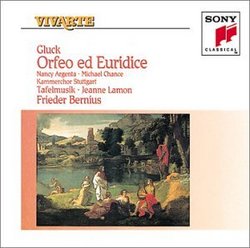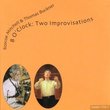| All Artists: Christoph Willibald Gluck, Frieder Bernius, Jeanne Lamon, Nancy Argenta, Michael Chance, Stefan Beckerbauer, Tafelmusik, Kammerchor Stuttgart Title: Gluck - Orfeo ed Euridice / Argenta · Chance · Tafelmusik · Bernius Members Wishing: 1 Total Copies: 0 Label: Sony Original Release Date: 1/1/1992 Re-Release Date: 5/5/1992 Genre: Classical Styles: Opera & Classical Vocal, Historical Periods, Classical (c.1770-1830) Number of Discs: 2 SwapaCD Credits: 2 UPCs: 074644804027, 5099704804026 |
Search - Christoph Willibald Gluck, Frieder Bernius, Jeanne Lamon :: Gluck - Orfeo ed Euridice / Argenta · Chance · Tafelmusik · Bernius
 | Christoph Willibald Gluck, Frieder Bernius, Jeanne Lamon Gluck - Orfeo ed Euridice / Argenta · Chance · Tafelmusik · Bernius Genre: Classical
|
Larger Image |
CD DetailsSimilar CDs
|
CD ReviewsA voice teacher and early music fan George Peabody | Planet Earth | 01/16/2006 (5 out of 5 stars) "MAGICAL MICHAEL: VOICE EXOTIC (SOMEWHAT EROTIC); DELIVERY HYPNOTIC
A eulogy on Christoph Willibald Gluck's artistic achievement from the famed French philosopher Jean Jacques Rameau reads as follows: "It seems to me that Gluck and Louis XVI are going to usher in a new epoch". Gluck's treatment of "Orfeo" is indeed much different musically from his predecessors although the story is the same. Gluck set out to reform the nature and musical language of opera. This reform was directed on one hand at the unmistakeable stiffness of French opera littered with ballets and with the plot within the recitatives, and consequently somewhat deficient vocally. On the other hand, he attacked the Italian 'opera seria' with its confused dramaturgy. Through the years there have been many versions of this opera as to voice parts and roles. The version on this disc is the original Vienna version of 1762. Briefly the story is as follows: Euridice, the wife of the Greek singer Orpheus has been killed via a snakebite. Orpheus (not being able to bear his pain) descends into the underworld to rescue her. Amor(Cupid), the God of love,appears and informs him that Jupiter has given Orpheus permission to do so,but only on condition that as they return to the living world, he must not look at her or he will lose her forever. Orpheus travels thru terrifying areas,thru beautiful landscapes and finally a dark cave with a labyrinth. He finds Euridice and takes her hand, but does not look at her. But she is in despair and keeps urging him to do so. Orpheus can no longer bear the anguish and turns toward her, and instantly she dies; he then decides to take his own life. Cupid appears and prevents this happening, and because he was faithful even in death to Euridice, Cupid restores her life and they both return happily to the living world! Michael Chance's (Orfeo) countertenor sound is pure and clear, with a firm focus, a solid core to his voice; moreover, he makes Orfeo sound manly, but also profoundly expressive: listen to the shapely, evenly held lines and the perfectly moulded cadences. His aria "Che Faro..." is taken (for once) at the right tempo(not too fast) and thus takes it's place as a perfectly stylized expression of intense grief. This, along with Nancy Argenta's 'Che Fiero momento', and the recitatives, gives welcome substance to the first part of Act Three. The casting of Amor as a boy soprano ensures that the three voices are well distinguished (hurrah for that!) and Stefan Beckerbauer's (Amor) intonation is near perfect. I own many versions of this opera, but this is the one that excites me the most. The first word (and it is one word )sung by Orfeo (Michael Chance) sums up the entire drama of the opera. In all his agony and pain he literally screams (musically of course) the name "Euridice"!!!!!And we are on our way to having a wonderful musical experience from Chance's highly expressive rendition to the charming voice of "Amore" played by Stefan Beckerbauer (boy soprano). Nancy Argenta does her usual good job playing "Euridice". But Chance bears the brunt of of it all and his voice is all golden and full of pathos. Let's not forget the skillful job done by the orchestra and the Choir. All in all there's no way that you can't enjoy this recording. Brlieve me when I say that no other recording of this work even comes close to this one! " |

 Track Listings (25) - Disc #1
Track Listings (25) - Disc #1


